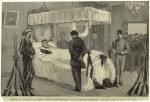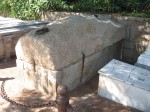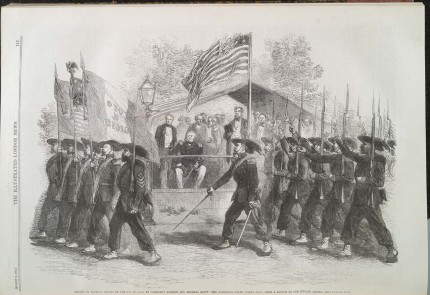 After a multi-year campaign, the descendants of Italian unification hero Giuseppe Garibaldi have secured permission to open his tomb on Caprera, an island off the northeastern corner of Sardinia, and examine the body within to confirm its identity. Anita Garibaldi, great-granddaughter of Giuseppe, announced the news at a press conference accompanied by Silvano Vinceti, who has made a less than savory career out of digging up the would-be remains of famous Italians like Caravaggio and Lisa Gherardini, the model for Mona Lisa. The campaign is supported by most of Garibaldi’s heirs and political figures from across the spectrum like leftist former Prime Minister Massimo D’Alema and rightist former Secretary of State Stefania Craxi.
After a multi-year campaign, the descendants of Italian unification hero Giuseppe Garibaldi have secured permission to open his tomb on Caprera, an island off the northeastern corner of Sardinia, and examine the body within to confirm its identity. Anita Garibaldi, great-granddaughter of Giuseppe, announced the news at a press conference accompanied by Silvano Vinceti, who has made a less than savory career out of digging up the would-be remains of famous Italians like Caravaggio and Lisa Gherardini, the model for Mona Lisa. The campaign is supported by most of Garibaldi’s heirs and political figures from across the spectrum like leftist former Prime Minister Massimo D’Alema and rightist former Secretary of State Stefania Craxi.
 The exhumation plan had the support of then Culture Minister Sandro Bondi in 2010, but the campaign didn’t want to push the issue at the time out of concern that they’d be accused of exploiting the upcoming 150th anniversary of the unification of Italy. So they held back until now, securing the approval of current Culture Minister Lorenzo Ornaghi. The tomb will be opened at the end of September.
The exhumation plan had the support of then Culture Minister Sandro Bondi in 2010, but the campaign didn’t want to push the issue at the time out of concern that they’d be accused of exploiting the upcoming 150th anniversary of the unification of Italy. So they held back until now, securing the approval of current Culture Minister Lorenzo Ornaghi. The tomb will be opened at the end of September.
 The controversy over the mortal remains of Giuseppe Garibaldi started when he died in his Caprera house on June 2, 1882. On his deathbed, he asked that his body be cremated in a simple ceremony in a spot where he once collected fragrant-burning wood. According to Anita, in his will he expressed a desire that his ashes be left for the people of Italy to pick up and disperse all over the country he helped stitch together with his military genius and unflinching dedication to human rights and civil liberties.
The controversy over the mortal remains of Giuseppe Garibaldi started when he died in his Caprera house on June 2, 1882. On his deathbed, he asked that his body be cremated in a simple ceremony in a spot where he once collected fragrant-burning wood. According to Anita, in his will he expressed a desire that his ashes be left for the people of Italy to pick up and disperse all over the country he helped stitch together with his military genius and unflinching dedication to human rights and civil liberties.
 For many politicians, including Garibaldi’s friend and prominent unification figure in his own right Francesco Crispi, that was far too modest a fate for an Italian hero of Garibaldi’s stature. The government requested that his body be embalmed, probably so it could be transferred in full pomp to the Pantheon or one of the other monuments of nationalist symbolism in Rome. That transfer never happened — at the end of June a bust of Garibaldi was installed on the Capitoline, right next to the equestrian statue of Marcus Aurelius, with much ceremony — but the embalming did. Garibaldi’s body was encased in a granite tomb in a small cemetery on his property on Caprera.
For many politicians, including Garibaldi’s friend and prominent unification figure in his own right Francesco Crispi, that was far too modest a fate for an Italian hero of Garibaldi’s stature. The government requested that his body be embalmed, probably so it could be transferred in full pomp to the Pantheon or one of the other monuments of nationalist symbolism in Rome. That transfer never happened — at the end of June a bust of Garibaldi was installed on the Capitoline, right next to the equestrian statue of Marcus Aurelius, with much ceremony — but the embalming did. Garibaldi’s body was encased in a granite tomb in a small cemetery on his property on Caprera.
 It didn’t go smoothly, though. They had trouble putting the lid on the tomb and it apparently took five attempts before it was finally sealed. That’s where the questions arose about whether Garibaldi’s body was still inside by the time they shut the thing. After exhumation, the DNA of the remains will be compared to that of his direct descendant, Claudio Garibaldi. If it turns out to be someone else buried in that tomb, Anita wants that to be broadcast far and wide so tourists won’t keep getting bamboozled like they have been for the past 130 years or so.
It didn’t go smoothly, though. They had trouble putting the lid on the tomb and it apparently took five attempts before it was finally sealed. That’s where the questions arose about whether Garibaldi’s body was still inside by the time they shut the thing. After exhumation, the DNA of the remains will be compared to that of his direct descendant, Claudio Garibaldi. If it turns out to be someone else buried in that tomb, Anita wants that to be broadcast far and wide so tourists won’t keep getting bamboozled like they have been for the past 130 years or so.
Should the body prove to be that of the general, the next controversy will be whether to rebury it in the granite tomb, or to comply with Garibaldi’s final wishes. The descendants and Vinceti plan to poll Italians to see what they think should be done. Apparently Anita has been getting death threats over the exhumation, so at least some Italians have expressed their opinion already. The final decision on the disposition of remains in theory belongs with the family, but who knows how this will play out.
I discovered something rather marvelous about Giuseppe Garibaldi earlier this year. In July of 1861, just four months after the proclamation of the Kingdom of Italy and three months after the opening of hostilities at Fort Sumter, Lincoln, through Secretary of State William H. Seward, offered Garibaldi a commission as Major General in the Union Army. According to this long and fascinating article on the subject, Seward instructed the Minister to Belgium, Henry Shelton Sanford (founder of the town of Sanford, Florida, which has recently made the ugliest of news due to the killing of Trayvon Martin), to approach Garibaldi with the offer.
I wish you to proceed at once and enter into communication with the distinguished Soldier of Freedom. Say to him that this government believes his services in its present contest for the unity and liberty of the American People, would be exceedingly useful, and that, therefore, they are earnestly desired and invited. Tell him that this government believes he will, if possible, accept this call, because it is too certain that the fall of the American Union, if indeed it were possible, would be a disastrous blow to the cause of Human Freedom equally here, in Europe, and throughout the world. Tell him that he will receive a Major-General’s commission in the army of the United States, with its appointments, with the hearty welcome of the American People. Tell him that we have abundant resources, and numbers unlimited at our command, and a nation resolved to remain united and free.
After a little pas de deux with King Victor Emmanuel, who was only too happy to extend Garibaldi his permission to go fight the Civil War so he wouldn’t be stirring up trouble at home with his advocating for democracy and universal suffrage, Garibaldi pitched his counteroffer to Sanford. Sanford reported it to Seward:
He said that the only way in which he could render real service, as he ardently desired to do, to the cause of the United States, was as Commander-in-Chief of its forces; that he would only go as such and with the additional contingent power—to be governed by events—of declaring the abolition of slavery. He would be of little use, he said, without the first and, without the second, the war would appear to be like any civil war in which the world at large could have little interest or sympathy.
Lincoln was not willing to emancipate the slaves so early in the war, nor even to declare it the ultimate aim of the conflict, so that was the end of that. What a marvel of counterfactual history to contemplate, though: Giuseppe Garibaldi, the man who unified a country splintered for 2000 years with 1000 redshirted volunteers, leading the Union Army from the beginning instead of the miserable lineup of incompetents who followed.
